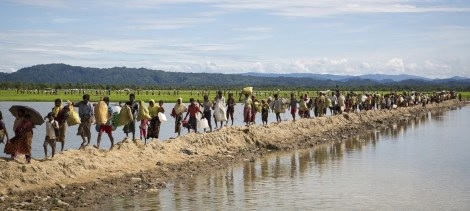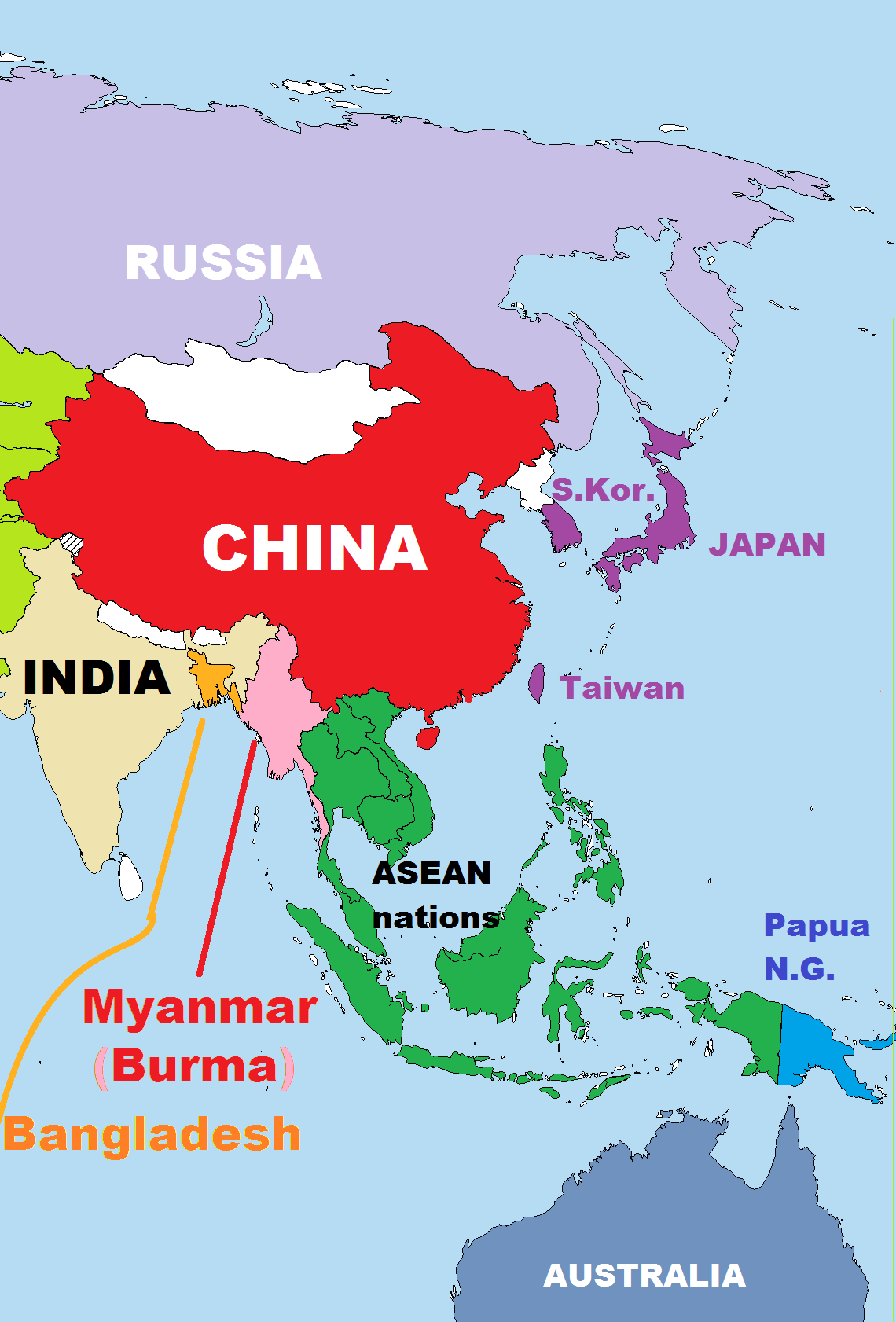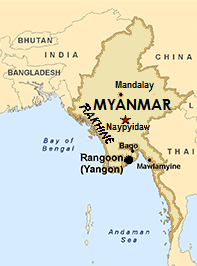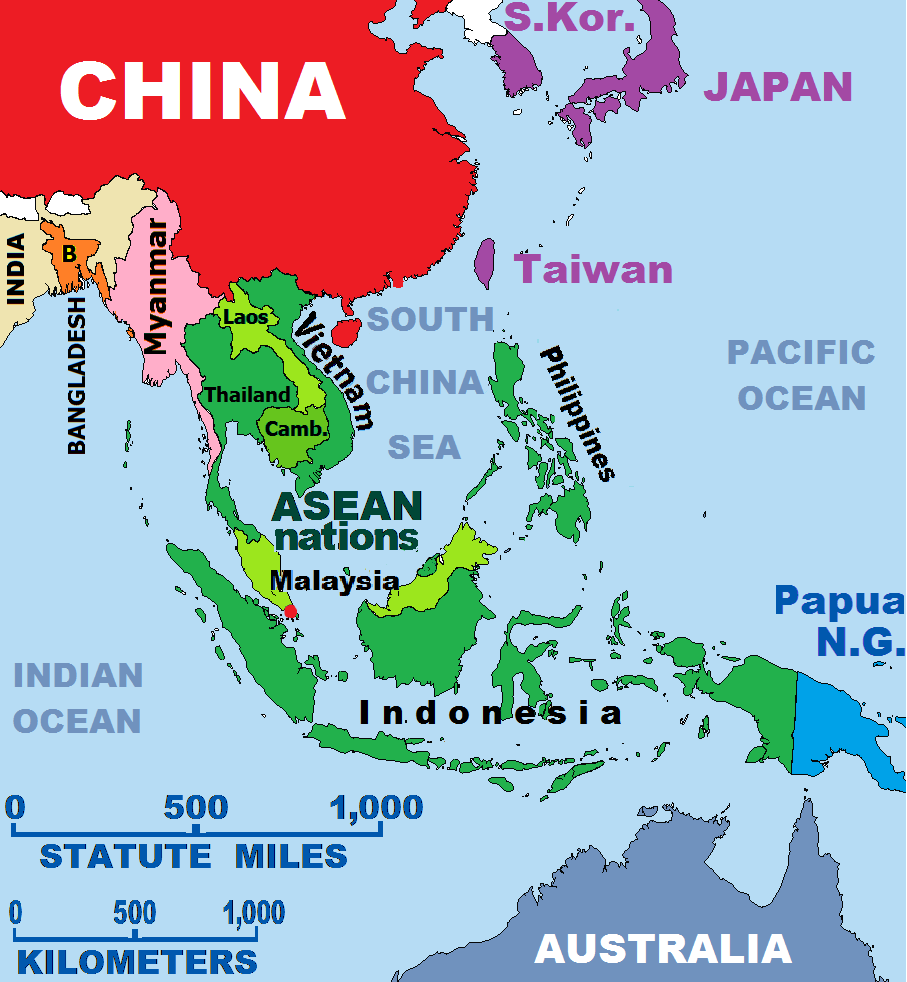
|
ABOVE: Torched Rohingya homes burn.
© 2017 Australian Broadcating Corp.
BELOW: Rohingya refugees walk on a muddy path as others travel on a boat after crossing the Bangladesh-Myanmar (Burma) border, in Teknaf, Bangladesh, September 6, 2017.
© 2017 Reuters
|

|

|

|

|
The Rohingya Crisis:
Current Affairs Summary
Compiled by
Richard Harris
TABLE of CONTENTS:
THE CURRENT CRISIS:
The recent crisis has resulted from a move in July/August 2017 by the Myanmar military, aided by Rakhine Buddhist militants, against Rohingya civilians (mostly Muslim) -- involving arbitrary arrests, torture, rape and killing of Rohingya, and forcing others into concentration camps.
The August 24th release of the Annan Commission report — a study led by former U.N. Secretary general Kofi Annan, evaluating the Rohingya situation, and laying out a framework for resolution (opposed by the Myanmar military) — was overshadowed by an attack on Myanmar security forces by a small group of lightly-armed Rohingya militants ("ARSA" - the "Arakan Rohingya Salvation Army"), the following morning, killing about 18 Myanmar military personnel, border guards and police, who killed about 50 of the attackers.
On the pretext of responding to that attack, the Myanmar military instantly accelerated its campaign against the Rohingya, radically -- launching sweeping attacks on Rohingya civilians throughout Myanmar's northern Rakhine state, mostly populated by Rohingya -- calling the attacks a "clearance operation" against "terrorists."
The killings, tortures, rapes and kidnappings of Rohingya, and the burning of their villages, accelerated to a unprecedented pace (over 200 villages burnt to the ground within weeks). While the Myanmar Army claimed, in September, that it has killed only about 150 "terrorists," interviews with refugees suggest the death toll to be in the thousands -- nearly all innocent civilians including the elderly, women and children. (Doctors treating refugees report bullet wounds in refugees' backs, stab and hack wounds, severe rape injuries, and burns.)
The Myanmar authorities claimed that the Rohingya were burning their own villages, and fleeing voluntarily -- but refused to allow international observers or media access to the area, to see for themselves. In fact, they have arrested reporters who have uncovered atrocities, and have begun bulldozing, and paving over, the remains of torched Rohingya villages, erasing evidence.
Refugees report that, during the attacks on their villages, they were told to get out of Myanmar, and "return" to Bangladesh, which most Myanmarese claim is the Rohingya's proper homeland. Within a few weeks of the violent military "clearance operations," hundreds of thousands of Rohingya refugees streamed across the border into Bangladesh, continuing to the present -- the largest, most-sudden mass-migration of people in the world, in decades.
Impovershed, densely populated Bangladesh -- after initially resisting the influx -- has done its best to accommodate the horde of refugees -- which, as of by early December, has reached over 640,000 (most of the Rohingya population of Myanmar), and continues to arrive, though in dwindling numbers. This adds to the over 200,000 Rohingya already in Bangladesh, having fled from pre-August (even pre-2017) attacks in Myanmar.
The large and growing refugee camps are straining the resources of Bangladesh and international aid organizations, while the crowded camps threaten the spread of fatal disease epidemics, and growing civil unrest. Water is in short supply, and dwindling.
In desperation, and to appease voters in the upcoming election, the Prime Minister's government is seeking various ways to rid Bangladesh of the Rohingya masses. International pressure halted Bangladesh's initial attempts, in 2015, to dump Rohingya refugees on a frequently-underwater new silt island off the coast (Thengar Char or Bashan Char) -- but that plan has just been revised, in early December, 2017 -- and ordered forward.
At the same time, China sponsored Bangladesh-Myanmar negotiations that resulted in tentative Myanmar promises to begin "repatriation" of Rohingya to Myanmar starting in February -- though the U.N. and international aid groups warn that it is too soon, too limited, and lacks guarantees of the Rohingyas' safe return to their homes. Myanmar has announced plans to put returnees "temporarily" in concentration camps.
While the crisis has stirred international outrage, most nations in the region -- and the world -- have been slow to respond to the crisis, and indifferent, ruthlessly opportunistic, or hostile towards its victims, and often sympathetic and supportive to the perpetrators.
WORLD RESPONSE:
Graphs, below: Key nations to Myanmar & the Rohingya Crisis: "Populations by Religion" and "National Wealth by Annual Gross Domestic Product" ($US billions)
CLICK ON GRAPH TO ENLARGE as SEPARATE TAB
|

|
(Source: Data calculated from 2015 World Almanac. R.Harris.)
(NOTE: Japan is 86% Shinto, but also 71% Buddhist, because most Japanese Buddhists also practice Shinto, and vice versa. Graph only shows Buddhism and "Other/None"; Shinto is incorporated into those numbers.
|
Most nations in the region, and the world, have been slow to respond to the crisis -- while others (particularly those eager to trade with Myanmar, such as China and India) quickly sided with the perpetrators, initially. However, by late 2018, global sympathy for the Rohingya began to mount, as evidence of Myanmar's military abuses became increasingly obvious.
By late 2018, Western and Muslim nations were almost universally expressing outrage about the Crisis, and primarily blaming Myanmar's military and civilian government -- but took no substantial action. The United States refrained from taking a substantial role in the issue for several months, but in late 2018 began to show real concern.
Officials of the United Nations have largely concurred, expressing extreme concern -- but China and Russia (backed, at first, by India and Bangladesh) have used their veto power in the U.N. Security Council to prevent any forceful action by the United Nations to intervene.
The U.N. has been limited to providing extensive humantarian aid to Rohingya refugees who have fled to Bangladesh.
Eventually Bangladesh (the country to which most of the one-million Rohingya have fled), and later (halfheartedly) neighboring India, began advocating for the Rohingya -- but have taken no forceful action.
Southeast Asian nations have expressed concern, but most have avoided any substantial action or involvement. Australia, which has long sought to deter Asian refugee migrants (including Rohingya), and seeks trade with Myanmar, has avoided involvement. The same is true for the rice-consuming nations of East Asia (Myanmar is the world's leading rice exporter), though Japan has made unsuccesful efforts to mediate in the conflict.
Details and explanations are listed below, by country or region.
United States
- The United States,
in fact, had just elected a president who campaigned on an isolationist platform, on defeating "radical Islamic terrorism," and on a promise to temporarily "ban all Muslims from entering the United States."
President Trump's initial response to the attacks on the Rohingya Muslims was muted, while he cut in half the tiny number of refugees America accepts (from throughout the world) -- down to about 50,000 per year (one eighth, of one tenth, of one percent of the U.S. population).
Throughout the Rohingya Crisis, American media have avoided the subject, and most Americans have shown little concern or interest.
Americans, generally, have kept preoccupied with their own issues: political sex scandals, Russian-interference probes, hurricanes and wildfires, and (to a lesser extent) the rise of North Korean nuclear proliferation and threats.
Since America's utter defeat in its last engagement in Southeast Asia (the Vietnam War, an event that split the nation, politically and socially, during the 1960s and 1970s), the U.S. has avoided involvement in Southeast Asia.
Ironically, America's only major engagement, there, recently, was to push for the Myanmar military junta to allow a token civilian leadership role for populist dissident Aung San Suu Kyi, in a nod towards democracy. But the fragile arrangement is threatened by the Rohingya Crisis, and by world reaction to the complicit Suu Kyi, in whom the U.S. has invested so much effort -- complicating the U.S. response.
However, Secretary of State Tillerson eventually began engagement on the issue, and -- long after the U.N and others had made similar statements -- Tillerson, in October, called for a halt to the violence, and in November declared the attacks on Rohingya were "ethnic cleansing." Except for a few scripted remarks, President Trump remained quietly on the sidelines.
By early 2018, the Trump administration was making feeble gestures at sanctioning certain generals of the Burmese army, but with little impact. Congressional concern was greater, and Congress eventually pushed for humanitarian aid to the Rohingya (at nearly $300 million by the summer of 2018), and urged the administration to do more. By the Spring of 2018, the administration began calling for measures of "accountability" for the Rohingya's persecutors, particularly Myanmar's military, but has failed to over-ride the U.N. vetoes of China and Russia.
 While President Trump remained on the sidelines, avoiding the issue, the U.S. Congress -- in various bipartisan gestures -- attempted, time and again, to pass legislation on the issue.
-- particularly
resolutions condemning Myanmar's treatment of the Rohingya, and bills intended to invoke (feeble) punitive measures.
While President Trump remained on the sidelines, avoiding the issue, the U.S. Congress -- in various bipartisan gestures -- attempted, time and again, to pass legislation on the issue.
-- particularly
resolutions condemning Myanmar's treatment of the Rohingya, and bills intended to invoke (feeble) punitive measures.
However, such efforts have generally been blocked, effectively, by Senate Majority Leader Mitch McConnell (Republican of Kentucky), who effectively controls the agenda of the U.S. Senate, and has personal ties to Myanmar's civilian figurehead, Aung San Suu Kyi.
McConnell was actively engaged in the U.S. campaign, in the late-1990s / early 2000s, to have dissident Suu Kyi released from Myanmar military custody, and installed as a national leader. They developed a "close" friendship, and McConnell remains firmly loyal to Suu Kyi.
Despite the American Jewish community's traditional bias against Muslims, some prominent Jewish organizations have been vocal in support of the Rohingya -- arguing that the attacks on the Rohingya are acts of "ethnic cleansing" and "genocide," resembling the early stages of the infamous Holocaust, of World War II, that wiped out the Jews of Europe.
 The most significant gesture, perhaps, was the public resignation of high-profile American Democrat and former diplomat Bill Richardson -- former U.S. Ambassador to the United Nations and former New Mexico Governor -- from a commission established by Myanmar's civilian figurehead leader, Aung San Suu Kyi. The commission was supposedly established to guide implementation of reconciliation proposals for Myanmar's Rakhine state, which had been put forward by the previous "Kofi Annan" commission -- including restoration of the Rohingya to their lands, granting of citizenship, and provisions for their security. Richardson -- the most prominent member of the commission -- blasted Suu Kyi as deaf to criticism, and he described the new commission as simply a tool to "whitewash" the crimes of the Myanmar government.
The most significant gesture, perhaps, was the public resignation of high-profile American Democrat and former diplomat Bill Richardson -- former U.S. Ambassador to the United Nations and former New Mexico Governor -- from a commission established by Myanmar's civilian figurehead leader, Aung San Suu Kyi. The commission was supposedly established to guide implementation of reconciliation proposals for Myanmar's Rakhine state, which had been put forward by the previous "Kofi Annan" commission -- including restoration of the Rohingya to their lands, granting of citizenship, and provisions for their security. Richardson -- the most prominent member of the commission -- blasted Suu Kyi as deaf to criticism, and he described the new commission as simply a tool to "whitewash" the crimes of the Myanmar government.
China & India:

|
China and India (the two principal powers in the region) initially showed no sympathy for the Rohingya -- siding, instead, with the Myanmar government.
Both nations have strategic and economic interests in Myanmar, particularly in Rakhine state, that stand to benefit from the "clearance" of its Rohingya majority from their homeland, and Myanmar's confiscation of their lands.
While playing both rivals, India and China, against each other for its own benefit, Myanmar's government has grown particularly close to China, who seeks to use Rakhine state as China's future port on the Indian Ocean -- and China, wielding its veto power in the the United Nations Security Council, is protecting the Myanmar military and government from any meaningful response to the crisis by the international community.
Details on each country:
China:
- China -- an authoritarian Communist nation --
staunchly opposes the spread of democracy (including recent advances in Myanmar), opposes international enforcement of human rights, and favors authoritarian "crackdowns" on dissident minorities (at home and abroad), and has long been
at odds with its own Muslim minority.
More immediately, China needs Rohingya land for its massive "development" plans for Myanmar's northern Rakhine state. China has announced plans to exploit that region -- mostly populated by Rohingya -- for development of a critical new major seaport for China, at Kyaukphyu, which has enormous economic and strategic importance. China also plans other "economic development" projects in Myanmar, particularly in northern Rakhine state (particularly in its "Kyaukphyu Special Economic Zone," next to the new port). Those projects stand to benefit greatly from the "clearance" of the Rohingya majority from their homes and lands.
Central China is heavily dependent upon a pipeline for natural gas from an underwater gas field off the coast of Myanmar's Rakhine state. Further, Myanmar is one of the world's foremost exporters of the food that China depends upon -- rice -- and Rohingya lands are valuable for agriculture).
Blocking out the usual U.N. and international organizations from the process -- largely though its veto power in the U.N. Security Council -- China has privately brokered a deal between Bangladesh and Myanmar for the return of Rohingya to Myanmar. Though the deal is fraught with uncertainties, and opposed by most Rohingya and world opinion, Myanmar has indicated that some Rohingya "with proper papers" (which few have) will be allowed to return, but will be promptly (and "temporarily") placed in "displacement camps" -- where they will have "opportunities for work."
Under the Chinese deal, Myanmar refuses to guarantee any protections, rights, or return of property to the Rohingya -- but China indicates it will "improve" conditions for Rohingya with its "economic development" projects, which will create "job opportunities" for them.
No word on what the jobs will pay, nor whether employment will be voluntary.
India:
- India
is now led by a nationalist government opposed to immigrants, particularly Muslims, and has economic and strategic interests in Rakhine state (and Myanmar generally) which supersede any interest in the Rohingya. Indeed, the Rohingya are an obstacle to India's announced plans to exploit their region. And India has recently developed a critical seaport in the capital of Myanmar's Rakhine state, at Sittwe, to serve India's land-locked northeastern corner.
In fact, the current Crisis erupted just as the Indian government was aggressively purusing a deportation case, in the courts, against 40,000 Rohingya already in India.
Various factors, however -- including the egregious violations of human rights in the Rohingya Crisis, matched with growing internal dissent (particularly from India's large Muslim minority, but also from many of the majority Hindus), and international pressure -- eventually forced the government of Prime Minister Modi to soften its stance on the Crisis, temporarily at least.
Southeast Asia:
Southeast Asian nations
(shown on the map in
shades of green,
but also including
Myanmar
).
are a complex assortment of underdeveloped nations -- loosely associated by the ASEAN (Association of SouthEast Asian Nations), who mutually agree to avoid interference in each others' "internal affairs."
The ethnic and religious mix in the region complicates the issue.
Some of the nations are predominantly Buddhist (Myanmar, Thailand, Vietnam, Cambodia, Laos), while others are mostly Muslim (Indonesia, Malaysia), and others have complex and sensitive mixes of those and other faiths (Malaysia, Singapore, Philippines) -- further complicating their response to the Buddhist/Muslim conflict in Myanmar.
Initial angry response by swarms of protesting Muslims throughout Southeast Asia soon faded, and has had little apparent impact on the Rohingya situation.
None of these nations are economically healthy enough to accommodate the needs of large numbers of refugees, and some have even found it profitable to exploit the fleeing Rohingya. Most of the nations have much less military and economic power than Myanmar, and few have sufficiently strong, stable, democratic governments to engage in conflict, or to exert forceful diplomacy and economic influence.
Most important, though, is their need to accommodate the wishes of increasingly belligerent China, which has become the dominant and rising power in the region -- particularly in light of Amercia's detachment from Asia, under the new U.S. president.
Muslim Middle-East nations
and adjacent regions:
Muslim nations in the Middle East and adjacent regions (shown on the map in light green).
are preoccupied with their own endless wars, and power struggles. Their only involvement, recently, was their apparent minimal support for the few Saudi-based Rohingya militants of ARSA... whose feeble August attack in Myanmar only encouraged -- and provided an excuse for -- the escalation of Myanmar's sweeping military attacks on the Rohingya.
Initial angry response by crowds of protesting Muslims throughout North Africa, the Middle East and Central Asia soon faded, and has had little apparent impact on the Rohingya situation.
Europe:
Europe
is preoccupied with:
- the disintegration of the European Union (particularly Britain's departure),
- threatening moves from Russia,
- the endless (but diminishing) stream of Muslim refugees from Africa and the Middle East, and
-
rising anti-Muslim nationalism and racism
in their own nations.
Initial angry response by crowds of protesting Muslims in some European nations, soon faded, and has had little apparent impact on the Rohingya situation.
Other nations:
Other nations
throughout the world have mostly been indifferent to the issue -- giving lip-service to the tortured Rohingya masses, but refusing to take any decisive and effective action.
Australia, the most powerful other nation in the region, has long struggled to keep out refugees from Asia, particularly the Rohingya -- impounding them in concentration camps in Papua New Guinea -- who has recently begun dismantling some of the camps, forcing the refugees to crowd into worse camps, while the Papuan government, and public, press for their deportation.
Canada, long a rich haven for refugees (including Muslims), got off to a bad start, when a U.N. official from Canada (Renata Lok-Dessallien) was assigned as the U.N. envoy to Myanmar prior to the developing Crisis. She concealed the Myanmar government's misconduct, and prevented U.N. human rights investigators from reporting their discovery of the emerging crisis, or even investigating it. She was finally replaced when the crisis exploded, and her concealment of the problem was exposed.
Subsequently, the Trudeau administration has taken a more proactive stance, dispatching the Foreign Minister to the region, to attempt to ameliorate the crisis, though with modest effect, if any. Canada has become one of the principal sources of aid for the Rohingya refugees.
Japan, South Korea and Taiwan
have taken some interest in the issue, but their lack of Muslim inhabitants, and substantial numbers of Buddhists, have arguably undermined any motivation to act.
Those nations have been preoccupied with North Korean military developments (particularly nuclear and missile developments and missile launches), and with the increasingly militant expansionism of their giant neighbor, China.
Their overwhelming reliance on Muslim Middle-East oil, however, mandates a certain amount of sensitivity to Muslim global issues.
South Korea has also been distracted by dramatic internal political events, and a new isolationist, pacifist government -- confronted by the rise of North Korean nuclear proliferation and threats.
Japan, however, has long sought to serve as a mediator and conciliator for various Myanmar minorities in conflict with the Myanmar government and military. But its efforts to mediate in the Rohingya Crisis were elbowed aside by powerful neighbor China -- already deeply involved with Myanmar's government and military -- who sought to serve as the sole mediator in bilateral negotiations between Myanmar and Bangladesh.
Russia remains largely disinterested in the Rohingya Crisis, except to counter rivals America and Europe -- while teaming with China to prevent the spread of democracy and human rights, and generally oppose Muslims (as Russia continues its conflicts with Muslims at home, and throughout the Middle East and Central Asia).
Russia's veto power in the U.N. Security Council -- echoing China's -- ensures there will be no forceful action by the U.N. to protect the Rohingya.
Africa and Latin America continue to play no significant role in world affairs beyond their own continents -- while their mostly corrupt governments curry favor with the world's most-populous nation, and second-largest economy (soon to be first):
China,
which seeks expanded strategic and economic influence in those areas, and is eager to make ruthless deals with any corruptable officials in those regions.
|
|







 While President Trump remained on the sidelines, avoiding the issue, the U.S. Congress -- in various bipartisan gestures -- attempted, time and again, to pass legislation on the issue.
-- particularly
resolutions condemning Myanmar's treatment of the Rohingya, and bills intended to invoke (feeble) punitive measures.
While President Trump remained on the sidelines, avoiding the issue, the U.S. Congress -- in various bipartisan gestures -- attempted, time and again, to pass legislation on the issue.
-- particularly
resolutions condemning Myanmar's treatment of the Rohingya, and bills intended to invoke (feeble) punitive measures.
 The most significant gesture, perhaps, was the public resignation of high-profile American Democrat and former diplomat Bill Richardson -- former U.S. Ambassador to the United Nations and former New Mexico Governor -- from a commission established by Myanmar's civilian figurehead leader, Aung San Suu Kyi. The commission was supposedly established to guide implementation of reconciliation proposals for Myanmar's Rakhine state, which had been put forward by the previous "Kofi Annan" commission -- including restoration of the Rohingya to their lands, granting of citizenship, and provisions for their security. Richardson -- the most prominent member of the commission -- blasted Suu Kyi as deaf to criticism, and he described the new commission as simply a tool to "whitewash" the crimes of the Myanmar government.
The most significant gesture, perhaps, was the public resignation of high-profile American Democrat and former diplomat Bill Richardson -- former U.S. Ambassador to the United Nations and former New Mexico Governor -- from a commission established by Myanmar's civilian figurehead leader, Aung San Suu Kyi. The commission was supposedly established to guide implementation of reconciliation proposals for Myanmar's Rakhine state, which had been put forward by the previous "Kofi Annan" commission -- including restoration of the Rohingya to their lands, granting of citizenship, and provisions for their security. Richardson -- the most prominent member of the commission -- blasted Suu Kyi as deaf to criticism, and he described the new commission as simply a tool to "whitewash" the crimes of the Myanmar government.
